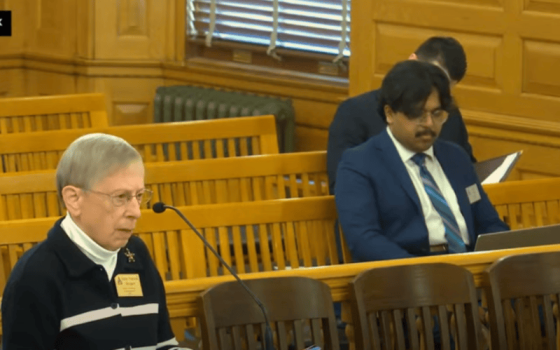MEXICO CITY -- Catholics who work with undocumented migrants welcomed Mexico's new immigration law, which gives expanded legal and human rights protection to the undocumented migrants transiting the country.
The law also promises to overhaul the country's immigration ministry in an effort to diminish corruption. Mexican President Felipe Calderon signed the law May 24.
It marks the latest effort to improve the treatment of undocumented migrants transiting Mexico on northward journeys to the United States. The journeys have become increasingly dangerous in recent years as criminal groups attack and kidnap migrants for ransom.
"The efforts of new administrations have started to give us hope," said Olga Sanchez Martinez, director of the Jesus the Good Shepherd Shelter for the Poor and for Migrants in Chiapas. Her shelter serves migrants whose limbs have been severed while jumping on and off of trains.
Sanchez, who attended the law-signing ceremony, said people who work with migrants have been treated with suspicion by the authorities and viewed as somehow involved in illegal activities. She and others cautioned that changing a culture among immigration authorities and long-corrupted police departments patrolling migrant routes might take some time.
"The behavior of some immigration agents has left something to be desired because they have lost the value of human beings," she said.
"The new law protects people like me, who have dedicated their lives to (defending) human worth," she added. "For the first time, shelters are being recognized for their extraordinary work."
Father Gianantonio Baggio, director of the Nazareth Migrant House in the border city of Nuevo Laredo, called the new law, "Very advantageous for migrants." He cautioned, however, "The problem is putting it into practice."
The law creates a new type of visa for migrants transiting Mexico. It also limits detentions in immigration facilities to 15 days, imposes new penalties for public officials criminally taking advantage of migrants and attempts to eliminate corruption in the immigration ministry by subjecting staff to more thorough vetting processes.
The National Human Rights Commission said more than 11,300 migrants had been abducted over a six-month period last year. The commission added that authority figures have been accused of being involved in the wrongdoings committed against migrants.
The immigration ministry recently began a purge of senior staff in an effort to eliminate agents with links to organized criminal groups. Immigration Commissioner Salvador Beltran del Rio also revealed plans to regularly rotate senior mangers around the country to make infiltration by organized criminal groups more difficult.




